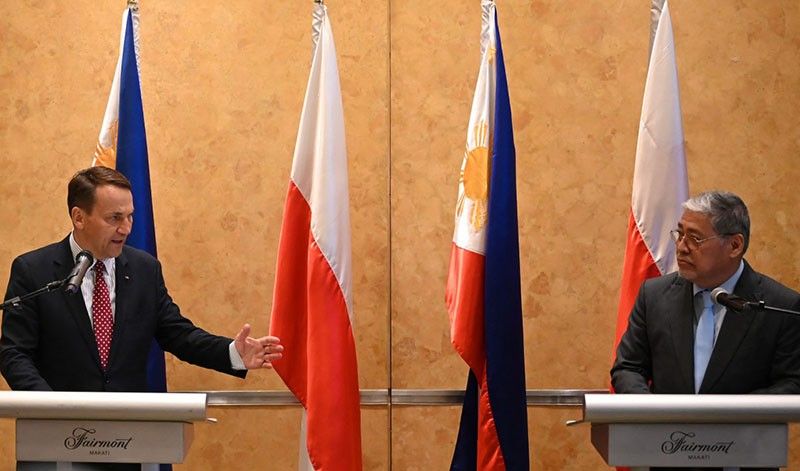Foreign Minister Sikorski’s visit to Manila: A glimpse at a geopolitical mirror

Polish Foreign Minister Rados?aw Sikorski recently visited the capitals of Singapore, Malaysia and the Philippines in his tour of Southeast Asia. Passing by Manila was auspicious, as both countries will commemorate the 51st anniversary of diplomatic relations on September 22.
During this three-day stay from September 3 to 5, he met with President Ferdinand Marcos Jr., Foreign Affairs Secretary Enrique Manalo and National Defense Secretary Gilberto Teodoro Jr. He discussed security and economic issues affecting Europe and our region.
Minister Sikorski also had the opportunity to deliver a lecture at an event hosted by Stratbase ADR Institute on September 5, on economic, social, political, and strategic issues.
In a nutshell, Sikorski’s lecture sought to promote a deeper understanding of the complex global security environment and stronger forms of cooperation to deal with shared concerns.
Specifically, he highlighted the impact of regional conflicts, such as the ongoing Ukraine-Russian war, on global peace and order. He advocated for stronger ties among like-minded democracies and diversified supply chains to mitigate vulnerabilities to coercion.
He identified opportunities for defense cooperation in cybersecurity, counter-terrorism, and maritime security. Sikorski emphasized his country’s commitment to multilateralism and international cooperation, stressing the importance of alliances and partnerships in addressing common security challenges.
Lastly, he expressed Poland’s support for ASEAN’s centrality in regional security architecture and highlighted the potential for deeper EU-ASEAN cooperation, arising from Poland’s ascendancy as EU president in 2025.
Despite being continents apart, Poland and the Philippines share similarities in defense and security matters. As a strategic location, Poland is a frontline state for the rest of Central Europe. It is a buffer against Russian aggression, which may come from the direction of Russia, Kaliningrad, or Belarus.
On the other hand, the Philippines sits astride the South China Sea which Beijing wants to control, and between two maritime axes of advance: one heading towards the mid-Pacific and the Americas, the other headed towards the Indian Ocean and beyond to Africa, the Middle East and Europe.
The South China Sea is a nexus for maritime trade, and any tension in the region has an impact on the safety of international shipping.
Poland sits at the immediate periphery of the Ukraine-Russian conflict. For now, it bears the brunt of wayward missiles intended for its eastern neighbor.
But there is always the unthinkable scenario of Russian armor, infantry, and drones overrunning Ukraine’s defenses and expanding toward the rest of Central Europe.
For the Philippines, the 200 Chinese navy, coast guard, and militia vessels concentrated within the South China Sea, are probing into and encroaching within the country’s exclusive economic zone.
On any given day, the country’s control over key features in the Spratlys Group of Islands is challenged by Beijing, either through the blockade of occupied shoals or the harassment of its resupply vessels.
Russia and China are irridentist states that covet the land and seas of their neighbors, that have broken the UN Charter and other relevant international laws, and that have used their hard power to compel and coerce their neighbors to acquiesce to their demands.
Poland benefits from the collective defense arrangement of the North Atlantic Treaty Organization (NATO) and hosts troops and infrastructure from the other members. This alliance is a remnant of the Cold War, but it has regained relevance following the recent display of Russian aggression in Ukraine and in the Black Sea.
On the other hand, the Philippines is a Major Non-NATO Ally (MNNA) eligible for certain defense trade and security cooperation arrangements with NATO. Of course, it has a mutual defense treaty with the US and strategic partnerships with other Indo-Pacific middle powers such as Australia, Canada, India, Japan and South Korea.
This engagement entails multilateral and bilateral exercises, port visits, personnel exchanges, and capacity-building programs to improve the Armed Forces of the Philippines (AFP).
For defense spending, Poland is looking at a 2%-of-GDP baseline for military expenditure. The Philippines is also bent on increasing its defense budget in response to the emerging security challenges in the region.
Part of this is channeled to the AFP modernization program, which should support a nascent comprehensive archipelagic defense posture. Polish manufacturer PZL Mielec has provided 48 S-70i Black Hawk helicopters for the AFP. There are other competencies from which the AFP can benefit from Polish experience and expertise.
Lessons can be drawn from the setup of the National Cyber Security Center. Other areas are air defense and military engineering.
On the developments unfolding in the South China Sea, Minister Sikorski's statement during his Singapore visit resonates. He pointed out that imperialism has historically benefited a few while oppressing many. In the case of China, the CCP’s brand of imperialism has made it the apex predator in its society and Southeast Asia, controlling and exploiting its citizens and neighboring states to serve the interests of the party.
He also extolled the value of multilateralism, despite its failures and shortcomings in global affairs. Again, this resonates. ASEAN may have been found wanting to prevent the major powers from making the region a battleground for influence and competition.
The Philippines can be the region’s game changer by pushing for an alternative multilateral mechanism. This would be a network of mini-laterals, cooperating in synergy whenever their interests converge, ad hoc but agile, and postured to deliver results with little formality, consisting of the like-minded democracies in East Asia and beyond.
Here in the Indo-Pacific, if China is Russia, and Taiwan is Ukraine, then the Philippines is Poland. The curse of geography compels us to mature as a state and accept our responsibility as a middle power.
The future peace and stability of the region will be predicated on the Philippines as the fulcrum and rallying point of like-minded democracies against China’s hegemonic ambition.
RADM Rommel Jude Ong (Ret.) is a non-resident fellow at the Stratbase Institute and professor of Praxis at the Ateneo School of Government (ASOG).
- Latest

























